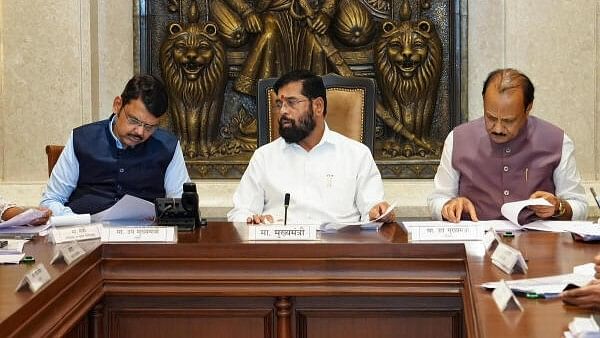
Maharashtra Chief Minister Eknath Shinde, Dy CMs Devendra Fadnavis and Ajit Pawar.
Credit: PTI Photo
Mumbai: Aimed to combat Naxals in urban areas, besides the rural and tribal pockets, the BJP-led Maha Yuti government on Thursday tabled the ‘Maharashtra Special Public Security Bill, 2024’.
In the past states like Chhattisgarh, Telangana, Andhra Pradesh and Odisha have enacted similar laws for effective prevention of unlawful activities.
Maharashtra’s deputy chief minister Devendra Fadnavis, who also holds the home portfolio and the law and judiciary ministry, tabled the Bill in the Assembly.
The Bill aims to give several powers to the government and the police machinery in curbing unlawful activities.
“The menace of Naxalism is not only limited to the remote areas of Naxal-affected states but its presence is increasing in urban areas also through Naxal frontal organisations. The spread of active frontal organisations of the Naxal groups give constant and effective support in terms of logistics and safe refuge to their armed cadres,” he said.
According to Fadnavis, the seized literature of Naxals shows “safe houses” and “urban dens” of the Maoist network in the cities of Maharashtra. “The activities of Naxal organisations or similar organisations through their united front are creating unrest among common masses to propagate their ideology of armed rebellion against the constitutional mandate and disrupting public order in the state,” he said.
He said that unlawful activities of such frontal organisations need to be controlled by effective legal means. “The existing laws are ineffective and inadequate to tackle this menace of Naxalism,” he said, adding that the Ministry of Home affairs, in various meetings, issued directions from time to time, for implementing mechanism for countering activities in of Naxals in urban areas and has suggested enacting legislations.
According to the Bill, unlawful activity means any action which constitutes a danger or menace to public order, peace and tranquility or interferes or tends to interfere with maintenance of public order or interferes or tends to interfere with administration of law or its established institutions and personnel.
When passed, association with an unlawful organisation will see a jail term from three to seven years and a fine of Rs 3 to Rs 5 lakh.
An advisory board will decide whether or not there is sufficient cause for declaring an organisation as unlawful. It will submit a report to the government in three months. All offences under this act will be cognisable and non-bailable. The offences will be investigated by a police officer not below the rank of a sub-inspector, the bill said.
All offences shall be registered under the written permission by an officer not below the rank of deputy inspector general of police who shall also specify the investigating officer who shall investigate the case.